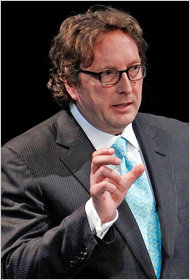 Jessica Rinaldi/ReutersPhilip A. Falcone, the head of Harbinger Capital Partners.
Jessica Rinaldi/ReutersPhilip A. Falcone, the head of Harbinger Capital Partners.
Harbinger Capital Partners, the hedge fund founded by Philip A. Falcone, could face civil action stemming from a federal investigation into whether the firm gave preferential treatment to Goldman Sachs, and other potential misdeeds.
Mr. Falcone received a Wells Notice from the Securities and Exchange Commission on Thursday, according to a regulatory filing by Harbinger. The agency typically takes such action when it is planning enforcement proceedings against a firm or individual. The notices were also sent to Omar Asali, Harbinger’s president, and Robin Roger, the firm’s general counsel.
The inquiry into Harbinger comes amid increased scrutiny for the industry. In recent years, the S.E.C. and other federal authorities have pursued a broad range of cases against hedge funds, taking aim at insider trading and other violations.
The S.E.C has been investigating whether Harbinger agreed in 2009 to allow Goldman to withdraw up to $50 million from the firm, while not striking similar deals with other clients, according to people with knowledge of the investigation who were not authorized to talk publicly. At the time, Harbinger had limited investors from redeeming their assets because of the market turmoil during the financial crisis. Before joining Harbinger, Mr. Asali was co-head of Goldman’s hedge fund strategy group, helping to steer client investments to outside managers, including Harbinger.
The government is also looking at the disclosure surrounding a $113 million personal loan that Harbinger made to Mr. Falcone in 2009, as well as possible market manipulation involving debt securities the firm traded from 2006 to 2008, according to the people.
In its filing, Harbinger said the notices focused on possible “violations of the federal securities laws’ antifraud provisions in connection with matters previously disclosed and an additional matter regarding the circumstances and disclosure related to agreements with certain fund investors.” Harbinger said that it was “disappointed” about the notices, and that it would “vigorously defend against” any formal charges, according to the filing.
A Goldman spokeswoman declined to comment.
With Harbinger already suffering from a wave of redemptions, the firm is taking new steps to limit withdrawals. Starting Dec. 30, Harbinger will bar investors from withdrawing money from four of its funds. Two of its portfolios, the Global Opportunities Breakaway Fund and China Dragon Fund, will still allow redemptions, according to one of the people familiar with the investigation.
Mr. Falcone, who founded Harbinger in 2001, made billions betting against subprime mortgages during the housing crisis. With his new fortune, he and his wife, Lisa Marie Falcone, quickly became prominent figures on the New York social scene. In 2008, Mr. Falcone bought a $49 million home once owned by Bob Guccione, the founder of Penthouse magazine. A year later, the couple announced a $10 million gift to the High Line park in Manhattan, a former elevated train track converted into a public space.
Harbinger, which held more than $26 billion in assets at its peak, has been struggling of late. The firm now manages $5.66 billion.
LightSquared, a wireless broadband company that is Harbinger’s primary investment, has become an albatross for Mr. Falcone.
He started the company in 2010 and planned to create a mobile network with frequencies that were originally used for satellite phones.
Those plans ran into trouble when some studies showed that the proposed network could interfere with global-positioning devices.
In January, the Federal Communications Commission gave LightSquared’s plan tentative approval despite lingering questions about the possible interference.
Senator Charles E. Grassley, a Republican from Iowa, has taken aim at the LightSquared venture and the F.C.C.’s oversight of the plan. In September, a group of lawmakers drafted a letter that questioned certain elements of Mr. Falcone’s plan.
Mr. Falcone has also faced criticism for telling investors this year that redemptions from some of Harbinger’s funds would be paid in shares of LightSquared stock, rather than cash.
“While this does not mean the S.E.C. definitely will take action against Mr. Falcone and his hedge fund, it does show that the S.E.C. staff believes there is sufficient evidence to consider recommending an enforcement action,” Mr. Grassley said of the Wells Notices in a statement Friday. “Now the F.C.C. is faced with the real possibility that it made a multibillion-dollar grant of valuable spectrum to someone who could be charged with violating securities laws.”
Azam Ahmed contributed reporting.
Article source: http://feeds.nytimes.com/click.phdo?i=de51c253b3987c0c095dc63d0f788673